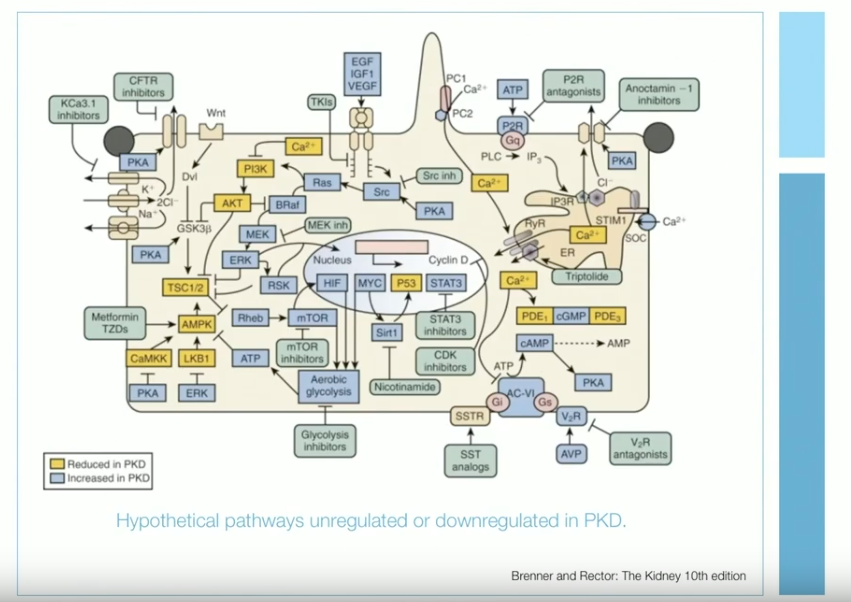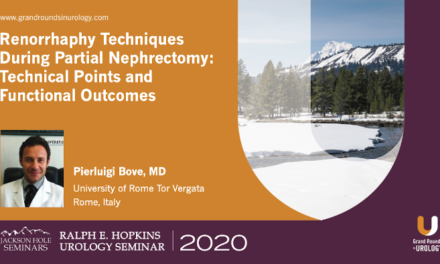Richard E. Link, MD, PhD, presented “Autosomal Dominant Polycystic Kidney Disease: Medical Considerations and Operative Magic Tricks” during the 23rd Annual Innovations in Urologic Practice on September 14, 2018 in Santa Fe, New Mexico.
How to cite: Link, Richard E. “Autosomal Dominant Polycystic Kidney Disease: Medical Considerations and Operative Magic Tricks” September 14, 2018. Accessed Dec 2024. https://dev.grandroundsinurology.com/autosomal-dominant-polycystic-kidney-disease-medical-considerations-and-operative-magic-tricks/
Autosomal Dominant Polycystic Kidney Disease: Medical Considerations and Operative Magic Tricks – Summary:
Richard E. Link, MD, PhD, provides guidance for urologic surgeons in the management of autosomal dominant polycystic kidney disease (ADPKD). He discusses relevant literature, patient selection, and the efficacy and safety of laparoscopic cyst decortication, as well as operative advice for handling massive kidneys during minimally invasive surgery.
Abstract:
ADPKD is the fourth most common cause of end stage renal disease globally. Along with progressive deterioration of renal function, ADPKD patients can develop a variety of symptoms. For example, hypertension, flank pain, cyst and urinary tract infections, nephrolithiasis, bleeding, and difficulty with eating can result from ADPKD. Native nephrectomy can also be a necessary adjunct to renal transplantation in a subset of cases.
This presentation reviews the contribution of the urologic surgeon to the management of ADPKD patients. Additionally, the discussion covers the spectrum of anatomic and symptomatic variation in ADPKD and how these factors influence surgical therapy in a patient-specific manner.
Today, the application of minimally invasive surgical techniques can be appropriate for the vast majority of operative scenarios with ADPKD kidneys. Limited literature supports the efficacy of laparoscopic cyst decortication to treat symptomatic ADPKD. This presentation provides guidance on patient selection and counseling for this procedure. It will also provide operative tips and tricks for handling massive kidneys during minimally invasive nephrectomy procedures to accelerate the learning curve.
About Innovations in Urologic Practice
Innovations in Urologic Practice (IUP) is an annual CME-accredited conference devoted to updating urologists on the rapidly changing healthcare environment. Topics focus on innovative diagnostic and treatment strategies, controversies, new and currently developing technologies, and challenges in today’s urologic practice. Dr. Link presented this lecture during the 23rd IUP in 2018. Please visit this page in order to learn more about future IUP meetings.
ABOUT THE AUTHOR
Richard E. Link, MD, PhD, Professor of Urology and the Carlton-Smith Endowed Chair in Urologic Education at the Baylor College of Medicine (BCM) in Houston, Texas, is a Board-certified and fellowship-trained urologist specializing in the treatment of urologic disease affecting the kidneys, ureter, and prostate. He focuses on the use of laparoscopic, robotic-assisted, percutaneous, and endoscopic techniques to treat kidney tumors, renal and ureteral obstruction, and urinary tract stones. He directs the BCM Division of Endourology and Minimally Invasive Surgery and is active nationally in teaching these techniques to other urologists through the American Urological Association Office of Education. He has also directed the BCM fellowship program in Minimally Invasive Urologic Surgery since 2008. He is the recipient of several awards specifically recognizing his commitment to teaching and mentoring, including two Fulbright and Jaworski LLP Faculty Excellence Awards (Teaching and Evaluation and Development of Enduring Materials) and several Resident Teaching Awards.
Dr. Link has been an early pioneer in the development of laparoendoscopic single-site donor nephrectomy. He serves as Director of Living Donor Procurement for several major kidney transplant programs in Houston, including
CHI/SLEH/BCM, Texas Children’s Hospital, and the Houston Methodist Hospital.
Dr. Link completed his PhD in Molecular and Cellular Physiology at Stanford University, CA. His research laboratory studies the genetic basis for renal cell carcinoma disease using a combination of genetically engineered mouse models, stem cell biology, and sophisticated whole genome molecular techniques. His clinical research interests include surgical simulation, decision analysis modeling, and the application of 3D reconstruction and printing techniques to surgical education.



